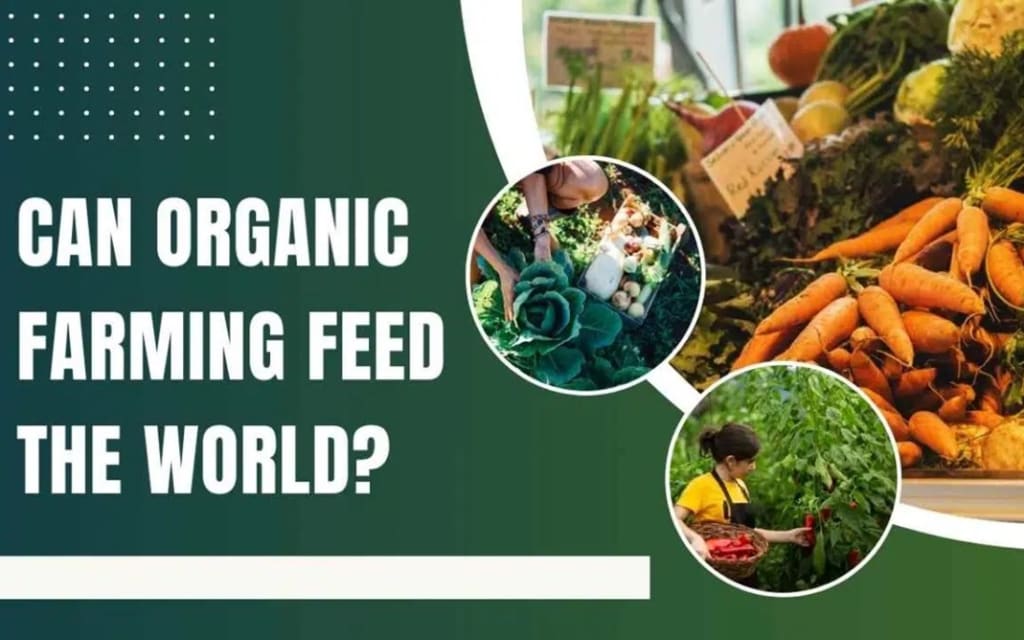Can Organic Farming Feed The World?
Can Organic Farming Feed The World?

Title: Can Organic Farming Feed the World? Debunking Myths and Exploring Realities
Organic farming has garnered significant attention in recent years, touted as a sustainable alternative to conventional agriculture. Proponents argue that it offers numerous environmental benefits, promotes biodiversity, and produces healthier food. However, a recurring question persists: Can organic farming truly feed the world's growing population? Debunking myths and exploring realities unveils a nuanced perspective.
Myth 1: Organic Farming Yields Are Insufficient
One common misconception is that organic farming yields are too low to sustain global food demand. While it's true that organic farming typically yields lower per-acre production compared to conventional methods, this doesn't necessarily translate to overall insufficiency. Studies have shown that organic farming can achieve comparable yields under certain conditions, particularly in diversified cropping systems and with proper management practices.
Moreover, organic farming emphasizes soil health and resilience, which can contribute to long-term sustainability and resilience to climate change. Healthy soils retain more water, mitigate erosion, and support diverse ecosystems, ultimately enhancing agricultural productivity over time.
Myth 2: Organic Farming Is Inefficient
Another misconception is that organic farming is inherently inefficient due to its reliance on manual labor and limitations in synthetic inputs. While it's true that organic methods often require more labor and attention to detail, efficiency should not be solely measured in terms of labor inputs or immediate yields. Organic farming emphasizes holistic approaches that prioritize environmental stewardship, biodiversity conservation, and long-term soil fertility.
Furthermore, advancements in organic farming techniques, such as precision agriculture, integrated pest management, and crop rotation strategies, are improving efficiency while maintaining ecological integrity. Embracing agroecological principles can enhance resilience to pests, diseases, and adverse weather conditions, reducing the reliance on costly external inputs in the long run.
Myth 3: Organic Farming Is Unaffordable for Small Farmers
Critics argue that organic farming practices are too expensive for small-scale farmers, particularly in developing countries. However, numerous studies have demonstrated that agroecological methods, including organic farming, can be cost-effective and economically viable, especially when tailored to local contexts and resource availability.
By minimizing external input costs, organic farming can improve smallholder farmers' profitability and resilience, reducing their dependence on expensive agrochemicals and genetically modified seeds. Additionally, organic certification programs and market incentives can provide small farmers with access to premium markets and fair prices for their produce, further enhancing their economic viability.
Realities of Organic Farming's Potential
While organic farming alone may not provide a complete solution to global food security challenges, it undoubtedly has a significant role to play in building a more sustainable and resilient food system. By prioritizing soil health, biodiversity conservation, and agroecological principles, organic farming offers a viable pathway towards achieving food security while mitigating environmental degradation and climate change impacts.
Furthermore, consumer demand for organic and sustainably produced food continues to grow, creating market opportunities for farmers who adopt organic practices. This trend not only supports local economies but also incentivizes farmers to transition towards more sustainable and environmentally friendly production methods.
Additionally, organic farming practices can contribute to addressing broader societal issues, including rural poverty alleviation, gender equity, and social justice. By empowering smallholder farmers, promoting community-led initiatives, and fostering inclusive agricultural policies, organic farming can help build more equitable and resilient food systems that benefit all stakeholders.
Conclusion
While organic farming may not be a panacea for global food security challenges, it represents a crucial component of a more sustainable and resilient food system. By debunking myths and exploring realities, we can recognize the significant potential of organic farming to feed the world while safeguarding environmental integrity and promoting social justice. Embracing agroecological principles, investing in smallholder farmers, and fostering supportive policies are essential steps towards realizing this vision of a more equitable and sustainable future for food production and consumption.
About the Creator
Kavya Organic Garden
Passionate about home gardening, plant care, growth, and maintenance. Join me on this exciting journey of organic practices and sustainable gardening! 🌱






Comments
Kavya Organic Garden is not accepting comments at the moment
Want to show your support? Send them a one-off tip.